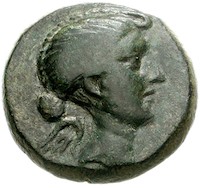#TBT: The Hairpin as “A Weapon Against Male Speech”

Thanks to our pal Silvia for pointing out this wildly important historical anecdote from Mary Beard’s winter lecture for the London Review of Books, entitled “The Public Voice of Women,” which Jia blurbed here back in February and which you should go read in full immediately:
One particularly bloody anecdote vividly exposes the unresolved gender wars that lay just below the surface of ancient public life and speaking. In the course of the Roman civil wars that followed the assassination of Julius Caesar, Marcus Tullius Cicero — the most powerful public speaker and debater in the Roman world, ever — was lynched. The hit-squad that took him out triumphantly brought his head and hands to Rome, and pinned them up, for all to see, on the speaker’s platform in the Forum. It was then, so the story went, that Fulvia, the wife of Mark Antony, who had been the victim of some of Cicero’s most devastating polemics, went along to have a look. And when she saw those bits of him, she removed the pins from her hair and repeatedly stabbed them into the dead man’s tongue. It’s a disconcerting image of one of the defining articles of female adornment, the hairpin, used as a weapon against the very site of the production of male speech — a kind of reverse Philomela.
OH MY GOD. Somehow, this function never even crossed my mind. Cicero, join these vaunted ranks. [LRB]